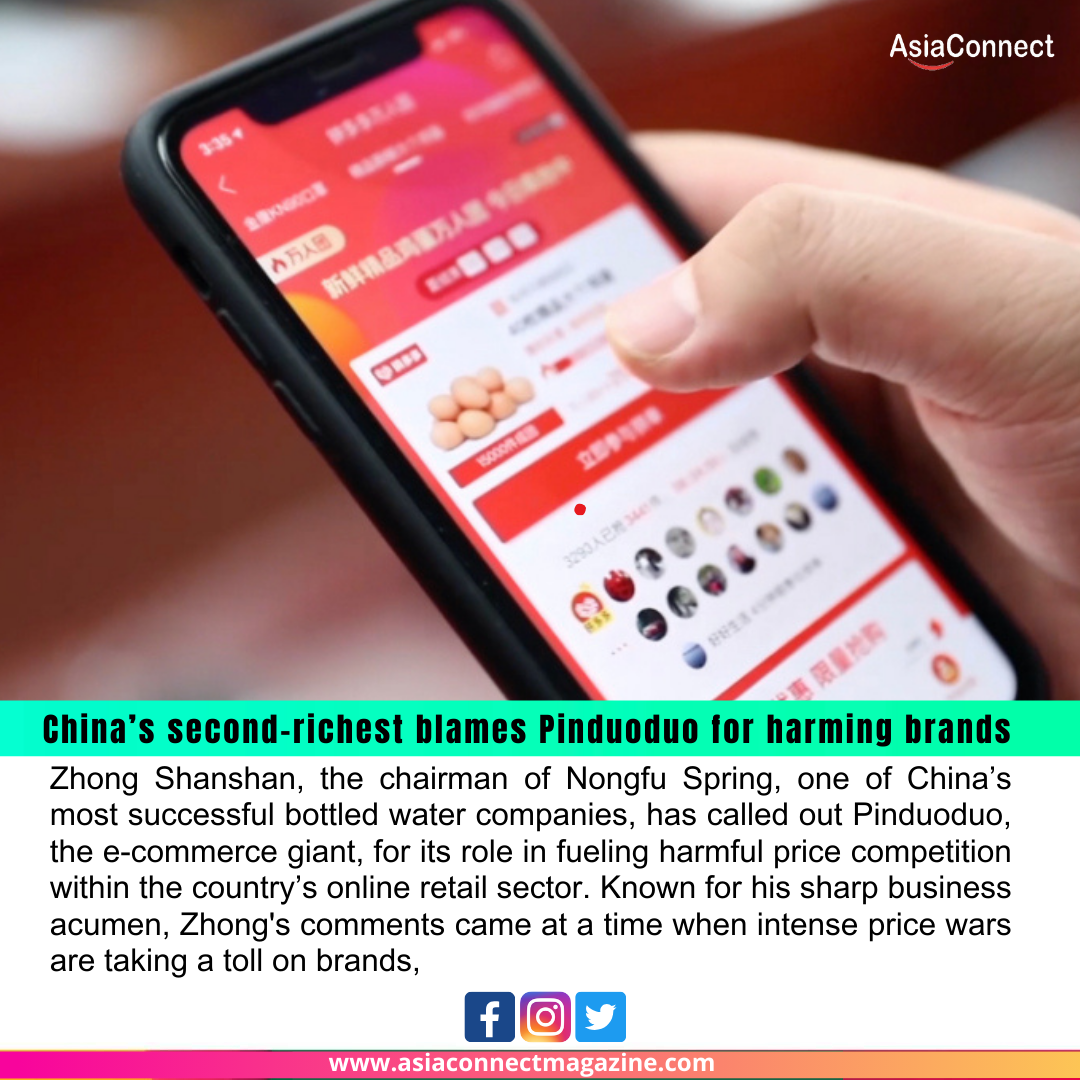Zhong Shanshan, the chairman of Nongfu Spring, one of China’s most successful bottled water companies, has called out Pinduoduo, the e-commerce giant, for its role in fueling harmful price competition within the country’s online retail sector. Known for his sharp business acumen, Zhong’s comments came at a time when intense price wars are taking a toll on brands, threatening their profitability and long-term sustainability. As the second-richest person in China, Zhong’s remarks carry weight, particularly given his position in both the consumer goods and broader Chinese business landscapes.
Price Wars and the E-Commerce Landscape
In recent years, Pinduoduo has made a name for itself by offering extremely low prices on a wide array of products, ranging from fresh produce to consumer electronics. The platform’s unique selling point is its “team buying” model, where consumers can get discounts by forming buying groups. While the model has proven popular, particularly in lower-tier cities, it has also sparked fierce price competition among e-commerce platforms. As a result, many established brands have been pressured into slashing prices to stay competitive, often at the expense of their margins.
Zhong, whose Nongfu Spring is a leading player in China’s bottled water and beverage market, has pointed to Pinduoduo’s aggressive pricing tactics as a key factor in this unhealthy race to the bottom. His company, which has enjoyed significant success due to its premium positioning in the market, has been one of the brands affected by the cutthroat pricing pressure. Zhong’s criticism highlights how Pinduoduo’s strategies can harm brand value by encouraging consumers to focus primarily on low-cost products rather than quality and branding.
Impact on Brands and Profitability
Zhong’s comments come during a challenging time for many companies in China’s consumer goods sector. The price wars, fueled by platforms like Pinduoduo, are putting immense pressure on brands to constantly adjust their pricing structures. This, in turn, undermines their ability to maintain profitability and invest in innovation, quality, and marketing.
Brands that have historically been able to command higher prices due to their established reputation and product quality are finding themselves forced to engage in price reductions, which could erode their brand value over time. Zhong himself has been vocal about the importance of maintaining a brand’s integrity and not compromising on quality for the sake of short-term sales.
Nongfu Spring, which went public in 2020 and quickly became one of China’s most valuable beverage companies, has carefully curated its brand identity, focusing on quality and premium offerings. The company has become a symbol of success, with its products often seen as a status symbol in China’s increasingly consumer-driven society. However, as Pinduoduo and other e-commerce platforms drive price competition, Zhong has warned that companies like his could be forced to compromise on their value propositions, which would ultimately hurt both consumers and brands.
The Future of E-Commerce and Brand Strategy
Zhong’s criticism of Pinduoduo’s business model also underscores a growing divide in China’s e-commerce sector between companies that rely on low prices to drive sales and those that focus on branding and premium products. In recent years, Chinese consumers have become more discerning, with many willing to pay a premium for products they perceive as high quality or luxurious. However, platforms like Pinduoduo are increasingly popular with price-sensitive consumers, which is creating tension within the market.
Moving forward, Zhong has called for a more sustainable approach to competition, one that balances price sensitivity with respect for brand value and quality. He argues that the race to lower prices should not come at the expense of long-term brand health and consumer trust.
For Pinduoduo, Zhong’s comments serve as a reminder that price wars, while effective in attracting consumers in the short term, may not always be the best long-term strategy. As the e-commerce sector matures, there may be increasing pressure on platforms like Pinduoduo to innovate in ways that support the broader ecosystem of brands and foster healthy competition.
Conclusion
Zhong Shanshan’s remarks about Pinduoduo’s role in harming brands reflect the growing tensions in China’s e-commerce market. The aggressive price competition fueled by platforms like Pinduoduo poses a significant challenge to businesses trying to maintain brand integrity while remaining competitive. As the market evolves, it will be crucial for both e-commerce platforms and brands to find a balance between price and value, ensuring that competition remains healthy and sustainable for all players involved.





